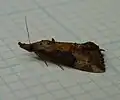| Hypena scabra | |
|---|---|
 | |
| Scientific classification | |
| Domain: | Eukaryota |
| Kingdom: | Animalia |
| Phylum: | Arthropoda |
| Class: | Insecta |
| Order: | Lepidoptera |
| Superfamily: | Noctuoidea |
| Family: | Erebidae |
| Genus: | Hypena |
| Species: | H. scabra |
| Binomial name | |
| Hypena scabra (Fabricius, 1798) | |
| Synonyms | |
| |
Hypena scabra, the green cloverworm or black snout, is a moth of the family Erebidae. The species was first described by Johan Christian Fabricius in 1798. It is found in North America from Canada south to Florida and Texas. It has also been reported from Great Britain.
The wingspan is 25–35 mm. Adults are on wing from March to November or all year round in warmer regions. There are multiple generations per year.
The larvae feed on low-growing legumes, including alfalfa, bean, clover, pea and soybean. They also feed on woody legumes such as false indigo and locust. Other reported hosts include birch, cherry, corn, elm, hackberry, New Jersey tea, poplar, ragweed, sida, strawberry and willow.
References
External links
- McLeod, Robin (October 30, 2018). "Species Hypena scabra - Green Cloverworm - Hodges#8465". BugGuide. Retrieved February 12, 2020.
- "930588.00 – 8465 – Hypena scabra – Green Cloverworm Moth – (Fabricius, 1798)". North American Moth Photographers Group. Mississippi State University. Retrieved February 12, 2020.
- Roberts, Phillip & Guillebeau, Paul (October 8, 2008). "Hypena scabra". BugwoodWiki. Retrieved February 12, 2020.
This article is issued from Wikipedia. The text is licensed under Creative Commons - Attribution - Sharealike. Additional terms may apply for the media files.

